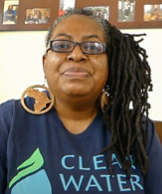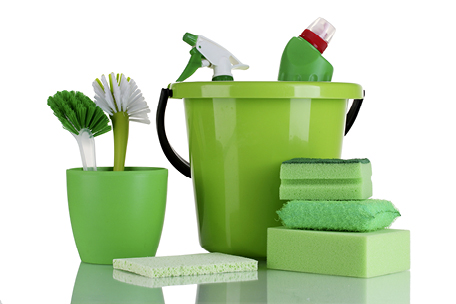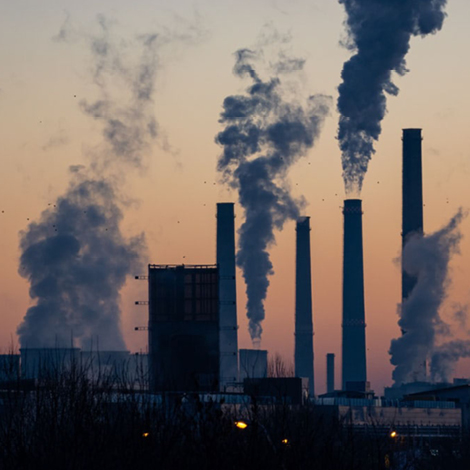In This Issue:
- We Cannot Be Silent. Black Lives Matter
- Tell Us Your Environmental Justice Story NJ
- Coronavirus Should Wake Us All Up to Environmental Injustice
- Pump the Brakes on Highway Expansions!
- COVID impacts on the Environment and NJ State Budget
- Stop Burning or Burying Food Waste
- Don't use COVID as a Cover to Go Backwards on Plastics
- Your Going Green Guide: Green Cleaning in a COVID World
- Climate Action in a Time of Social Distancing —A Virtual Gathering of Activists and Neighbors
-
DocumentCurr_NJ_06.16.20a.pdf (850.62 KB)
We Cannot Be Silent. Black Lives Matter.
We cannot ensure a safe and healthy environment for all people without addressing the racism that causes so much harm and inequity.
Black communities and other communities of color are often burdened with disinvestment, which leads to failing infrastructure. Polluting facilities like power plants, oil and gas operations, and incinerators are often located in or near communities of color. The people who call these communities home often don’t have access to parks, greenspace, or reliable public transportation. And they must often deal with a legacy of expulsive zoning, redlining, and bias, along with indifference from elected officials and policy makers. All of this has a devastating and generational impact on the health of the families in these communities.
This must end. We have to acknowledge and correct the historical harms that have led to clean air and clean water for some and pollution and degraded health for others. Clean Water Action is committed to combating racism and oppression in all forms, both internally and in our society.
Tell Us Your Environmental Justice Story NJ

Clean Water Action invites you to participate in an important video project that will demonstrate the environmental injustices that people are facing right now and inspire us all to take action. Tell your Environmental Justice Story — learn how to participate here.
Everyone deserves clean air and water, but many communities are suffering from toxic emissions that pollute air, harm our health and imperil our future. Sadly, some people have it far worse than others. This has been made even more stark by the disparate impact of the COVID-19 crisis, which is hitting the most vulnerable communities first and hardest.
I made a short video to share my environmental justice story. We hope that you can do the same. Click here to watch and for instructions on how to upload your own quick video.
Coronavirus Should Wake Us All Up to Environmental Injustice
Like so many of my peers in the environmental justice movement, my life as an activist started by being a mother of three asthmatic kids, Sonny, Frankie and Julian — growing up in Newark, New Jersey. Like so many Black children living in polluted zip codes, their asthma was not a coincidence but the result of air pollution caused by local industry, traffic, and, in our case, the 18,000 trucks that pass through the Port of Newark every day.

According to a recent Harvard Study, a small increase in exposure to particulate air pollution, like the kind that caused my childrens’ asthma, leads to a large increase in the severity of COVID-19 impacts. Just like crowded conditions at distribution centers and warehouses put workers at greater risk of contracting the virus and bringing it home to their loved ones and neighbors, the truck traffic going in and out of those facilities doesn’t just put workers at greater risk, but also the communities living near them.
When I see essential workers at Amazon, Walmart and grocery stores pushing for workplace protections, environmental activists like myself also see environmental justice heroes. Whether employers like Amazon like it or not, worksites exist in real places, near real people. When they don’t protect their workers, they endanger us all. Nothing reveals how true that is more than this virus.
My asthmatic children, Sonny, Frankie, and Julian, are highly vulnerable to the worst effects of COVID-19 — as are so many of my friends and neighbors. When I joined fellow environmental activists, elected leaders, and public health scientists on a video town hall to kick off World Asthma Month, everything felt a lot more urgent. COVID-19 reminded us why we started fighting for environmental justice in the first place. Frontline workers, community activists, environmentalists, parents, health professionals, and policy makers are uniting to fight for justice.
Baiyinah, a mother who lost her child to an asthma attack in Newark, is seeking to collaborate with other organizations after watching so many in our community struggle with the virus. My daughter looked at her recent asthma attack through an EJ lens and decided to connect with Asada, a Spellman College Environmental Science major and leading environmental justice initiatives with her peers.
Baiyinah, Frankie, and Asada are all the future of our movement. For all the havoc COVID-19 has brought to our communities, one thing seems true — the pandemic is a galvanizing moment, one moment that lays bare all the injustices and evils that environmental racism casts upon us. It calls on us to escalate our collective struggle.
TAKE ACTION: Communities of color and low-income communities have been disproportionately dumped on for too long. The state must address these injustices. Click here to tell your legislators to strengthen and pass NJ’s cumulative impacts bill!
Pump the Brakes on Highway Expansions!
There are $30 billion of mass transit improvements and “fix it first” transportation projects that need to be funded and prioritized over the next 10 to 20 years. Instead, the NJ Turnpike Authority recently approved its plan to raise tolls to fund over $16 billion of unneeded highway expansions on the Parkway and Turnpike. Expanding highways creates fewer jobs than repairing them, violates the State’s climate and clean energy goals, and increases air pollution. Check out this amazing op-ed co-written by State Director Amy Goldsmith, and our report of alternate transportation projects we should be prioritizing, instead of expanding highways.
COVID impacts on the Environment and NJ State Budget
The climate crisis is bearing down on New Jersey and the people who live here. We KNOW that some residents still have unacceptable levels of lead and other contaminants in their drinking water. We KNOW that low income communities and communities of color are more likely to breathe in dangerous diesel emissions or live near a contaminated site. We KNOW that NJ Transit is in desperate need of investment. These are not crises that are catching us by surprise.
Even before the pandemic began, New Jersey’s Clean Energy Fund had been robbed of $1.5 billion over the past 10 years. The state’s water infrastructure is still in desperate need of an infusion of cash to replace all the state’s lead service lines, and for capital upgrades to fixing stormwater systems, reducing unregulated contaminants, and eliminating combined sewers. Funding for critical DEP programs such as parks, environmental justice, water, diesel, and site remediation have been the focus of diversions to the General Fund, and to the Garden State Preservation Trust. NJ transit was already facing a structural deficit of $750 million dollars, but now with ridership levels at near zero due to the pandemic, it is facing at least an additional $2 billion shortfall through 2021.
New Jerseyans have a choice: Continue to repeat the mistakes of the past or raise revenue in a more equitable manner and reinvest in communities. Providing safe clean drinking water should not be a budget “choice” but a budget necessity. Investing in clean energy and functional mass transit is absolutely critical as our coastal state faces an uncertain climate future AND as these investments can help rebuild our economy. Reducing diesel emissions in environmental justice communities both helps kids with asthma breathe AND makes residents more resilient against the coronavirus. New Jersey is a crowded little state. New Jerseyans will rise or fall TOGETHER. A more equitable New Jersey will be a STRONGER New Jersey.
Take Action now by contacting your NJ legislators. Tell them what you think a recovery should look like, not just for the immediate crisis at hand, but sets a course for a brighter and more sustainable future.
Stop Burning or Burying Food Waste
Good news! Governor Murphy recently signed a food waste recycling bill (A2371) into law, which will reduce greenhouse gas emissions and air pollution in overburdened communities by diverting waste from large scale food generators that would otherwise be burned or buried to more sustainable mechanisms like composting. In NJ, 1.3 million tons of food waste are sent to landfills and incinerators each year. Under this law, large scale food waste generators — such as prisons, restaurants, and grocery store — will be required to separate their food waste and send it to an authorized food waste recycling facility within a 25-mile radius. We’re proud that New Jersey has taken this step to protect our resources, communities, and environment.
Nearly a third of all food produced in the world goes uneaten each year — an amount that costs the global economy $940 billion and emits 8% of planet-warming greenhouse gases. In the U.S., about 40 percent of all food produced is wasted. At the same time, 1 in 9 people are undernourished. While this law only applies to large food waste generators (52+ tons a year), there are steps you can take at home to prevent food waste like backyard composting, smart shopping and food storage, or donating to food banks. To learn more read the EPA’s Guide to Reducing Wasted Food At Home.
Don't use COVID as a Cover to Go Backwards on Plastics
The country and the world is still struggling with the COVID-19 crisis. Unfortunately, the plastics industry is trying to capitalize on the crisis to reverse the trend reducing reliance on single-use plastics. Worldwide, the industry is misrepresenting studies and claiming that reusables can spread the virus and that single-use plastics are a safer option. This is just not true.
Representatives from the CDC have publicly stated that there is very little risk of contracting the virus through surface contact, whether from plastics or reusables. This is especially true when we wash our hands and avoid touching our faces. Even if people are extra cautious about surface contact, a recent study in the New England Journal of Medicine found that COVID-19 can remain on plastic for up to three days. It is also known that washing reusables with soap and hot water is very effective at killing viruses remaining on any surfaces. A switch back to single-use plastics does nothing to stop COVID-19, but it does undermine recent efforts to reduce our reliance on a material that pollutes our world in every stage of its life: manufacture, disposal, and eventual breakdown in our oceans.
In the past few months during COVID-19, NJ towns — including Maplewood and Pennington — have ignored the plastics industry’s myths and passed or strengthened their own ordinances to ban plastics. You can still take action to urge your town to pass a local plastics ordinance!
Your Going Green Guide: Green Cleaning in a COVID World

While you are indoors you are more likely to be exposed to an increased amount of dust and household chemicals. Green cleaning means using less toxic cleaning products that are safer for people, animals, and the environment in homes, schools, and workplaces. Green cleaning practices can provide improved indoor air quality, reduce health risk from exposure, and protect the environment, while maintaining a healthy level of cleanliness and disinfection. Check out Clean Water Action’s Green Cleaning Guide to find out easy ways to switch to effective non-toxic products.
Climate Action in a Time of Social Distancing —A Virtual Gathering of Activists and Neighbors
We were excited about our 34th annual conference despite the change of venue. Incredible webinars below!
Healthy Democracy, Healthy Environment conference panel, April 5, 2020
Water in a Changing Climate, Climate Series, March 30, 2020
Consumer Footprints, Climate Series, April 7, 2020
The Green Youth Movement, Climate Series, April 14, 2020
Black Carbon & Dirty Ports, Climate Series, April 21, 2020
Equity in Green Grid, Climate Series, April 28, 2020
World Asthma Day Virtual Town Hall, May 5, 2020
The Story of Plastic Q&A Panel, May 16, 2020
